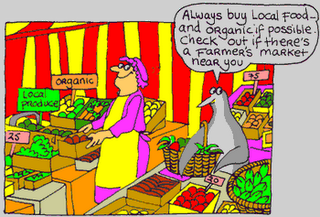2006: The Year the Climate Changed
In 2006, the climate changed, as it always does physically - getting warmer, getting cooler, getting dryer and getting wetter, more in some places and less in others. But the trend that has been with us for the last century continues - the earth is getting warmer, and the pace is picking up, and as the pace picks up, it will take more effort to put the brakes on as climate change begins to speed away into the distance.
At the same time, more people, including the Conservatives under Green Dave, church leaders, conservationists such as David Attenborough, more Americans including Al Gore, driven by simply bucketloads of hard science, are asking the big question - what are we doing about climate change? (and is it enough?) The political climate is also changing, even if Bush remains stubbornly resistant - and climate change is moving into the mainstream. The Guardian's John Vidal offers a similar and more in-depth analysis to these thoughts on a busy 2006.
Highlights (if you can call them that) from December:
Just yesterday, it was reported that a huge chunk (66 square miles) of an ice shelf that was part of Ellesmere Island, Canada, broke off and began to float off into the open sea. It happened in August 2005 but was only recently detected upon reviewing satellite imagery, which leaves you wondering how many other signs like this we're missing....
....new measurements on the rate of decline of Arctic sea ice (est. at -8.59% per decade), with the observation that the Arctic will be free of summer ice by 2040. There is a cool animation from the US National Center for Atmospheric Research illustrating changes until 2040...
....revised calculations that suggest that potential future sea-level rises have been underestimated, and that sea levels could rise by 59% more that previously thought...
....less snowfall for skiing on Europe's Alpine peaks, the weaknesses of the EU's ETS for carbon emissions, the fallacies of 'carbon-neutrality' and offsets, more on airport runway expansion, climate effects on other species and Miliband's carbon credit card mooted again, and finally (take a deep breath)...
...2006 may be Britain's warmest year ever-recorded, according to the Met Office and Hadley Centre - some 0.21C warmer than the previous records, that can only be explained by anthropogenic climate change.
Richard Black, the BBC's Environment correspondent, has a good piece summarizing political shifts on climate change in 2006. At the end of every year I rub my eyes and think 'was that another whole year gone just like that?' but then also think 'that's been a pretty long year where a lot has happened', and his summary 'Rhetoric up, action down' (which I urge you to read) is in that same spirit.
We have to do more in 2007 - make it our common resolution. Happy New Year!




